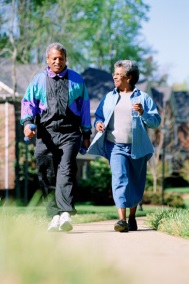Obesity in Texas
Having overweight and/or obesity challenges increases a person’s risk of serious medical conditions.
Obesity can cause a person to be more susceptible to:
- Heart disease
- Stroke
- High blood pressure
- Type 2 diabetes
- Certain cancers
These types of diseases may impact a person's quality of life and have large economic consequences for our healthcare system.
The rise in the number of children and adults who have overweight and obesity issues is a serious concern for Texas. The Obesity Prevention Program works with state and local partners to combat obesity. The overall goal is to create long-term change in our social and economic environments that address the obesity epidemic.
Obesity Prevention Priority Strategies
The Obesity Prevention Priority (OPP) Strategies report (en ingles) discusses the rising overweight and obesity rates among Texans. The report outlines evidence-based strategies for reducing obesity in Texas. These strategies are the first steps to developing a more collaborative approach to prevent obesity in Texas.
Nutrition
The Obesity Prevention Program helps Texans make nutritious, healthy food choices. Healthy food choices depend on access to affordable, nutritious foods.
Good nutrition is part of maintaining a healthy weight. Being at a healthy weight reduces the risk of chronic diseases.
These healthy habits lower your risks of obesity and chronic disease:
- Eating more fruits and vegetables
- Drinking plenty of water
- Consuming appropriate amounts of food and drink
- Decreasing consumption of added sugars and high-calorie, low-nutrient foods
Physical Activity
 |
 |
 |
 |
The Obesity Prevention Program works to make physical activity more accessible for Texans. Despite all the known benefits, many Texans do not get enough daily physical activity.
Many environmental changes contribute to less physical activity. For example, physical education taught in schools less often is a factor. Also, urban sprawl can make accessibility to physical activities more difficult.
View more benefits of physical activity and to review the current recommendations.
Early Childhood Education
Texas Healthy Building Blocks
Texas Healthy Building Blocks, powered by Go NAPSACC, is a statewide program designed to support and recognize early childhood education programs working to adopt evidence-based obesity prevention practices to improve the health of young children aged 0-5 years.
Learn more by visiting the Texas Healthy Building Blocks website.
ECE Professionals: If you help children learn, grow and play in or near the below counties, reach out to thbb@childcare.tamu.edu to get connected with a THBB Technical Assistant Consultant.
- Bexar, Travis, Smith, Taylor, San Patricio, San Antonio, Tarrant, Aransas, Bandera, Calhoun, Goliad, Bee, Refuge, Victoria, Jim Wells, Orange, & Wilson
